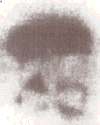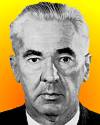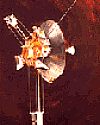 | TODAY IN SCIENCE HISTORY NEWSLETTER - 2 MARCH |
| Feature for Today |
 On 2 Mar 1896, Henri Becquerel reported, to the French Academy of Sciences, the interesting result he discovered the previous day—a plate fogged by a uranium compound laying on a photographic plate, even though the plate was wrapped in heavy black paper, and they had remained for several days in a dark drawer. He had been investigating phosphorescence connected with exposure to sunlight. This plate had been significantly fogged despite the absence of sunlight exposure. On 2 Mar 1896, Henri Becquerel reported, to the French Academy of Sciences, the interesting result he discovered the previous day—a plate fogged by a uranium compound laying on a photographic plate, even though the plate was wrapped in heavy black paper, and they had remained for several days in a dark drawer. He had been investigating phosphorescence connected with exposure to sunlight. This plate had been significantly fogged despite the absence of sunlight exposure.For scientists, the radioactivity train had just left the station, and now-famous scientists hopped on board! A few years later, in 1903, J.J. Thomson wrote about the Becquerel Rays and the resulting discoveries by other scientists in the next few years following Becquerel's first report that alerted the scientific community. Becquerel had opened up a new puzzle box for science, which was quicked dubbed "radio-activity." What we read about the structure of the atom in textbooks, is always presented as a chain of discoveries in a clear path. It wasn't. Read J.J. Thomson's article, and you'll see the path was not always clear. Even the best scientists experienced confusion at first. J.J. Thomson is revered as the discoverer of the electron, who won a Nobel prize just 3 years following this article. Yet Thomson, in this 1903 article, wrote this for the public to read: "To make a body radio-active all that is necessary is to get a layer containing a large quantity of positive electricity close to the surface of the body. We can, in this way, make radio-active substances without the use of any material that is intrinsically radio-active." Say what??? Well, you'll still get a good dose of worthwhile information reading Thomson's article on the history of Becquerel Rays, and it will raise a knowing smile as you recognize where Thomson was, as we know now, off the mark. Please don't be too smug as you see this wonderful snapshot of science unfoldingly. Hindsight is always 20/20. It is also interesting to see how Thomson is biassed by his own research into cathode rays which frames his views on radio-activity. |
| Book of the Day | |
| |
| Quotations for Today | |
 | "Mathematics education is much more complicated than you expected, even though you expected it to be more complicated than you expected." |
 | "I think at the moment we did not even want to break the seal [on the inner chamber of the tomb of Tutankhamen], for a feeling of intrusion had descended heavily upon us... We felt that we were in the presence of the dead King and must do him reverence, and in imagination could see the doors of the successive shrines open one." |
| QUIZ | |
| Before you look at today's web page, see if you can answer some of these questions about the events that happened on this day. Some of the names are very familiar. Others will likely stump you. Tickle your curiosity with these questions, then check your answers on today's web page. | |
| Births | |
 |  Georgii Nikolaevich Flerov, born 2 Mar 1913, who was one of the early Russian investigators of nuclear fission. In later research, as leader of the Dubna group, Flerov announced synthesis of isotopes of element 104 by smashing neon nuclei into plutonium (1965). Flerov gave this new element the name kurchatovium (Ku) in honour of the Soviet nuclear physicist Igor Kurchatov. Co-discoveries were made in the U.S., where a different name was used. For nearly two decades the world lived with three names for element 104 (including the interim name Unnilquadlium). The present name was finally adopted in 1997. Georgii Nikolaevich Flerov, born 2 Mar 1913, who was one of the early Russian investigators of nuclear fission. In later research, as leader of the Dubna group, Flerov announced synthesis of isotopes of element 104 by smashing neon nuclei into plutonium (1965). Flerov gave this new element the name kurchatovium (Ku) in honour of the Soviet nuclear physicist Igor Kurchatov. Co-discoveries were made in the U.S., where a different name was used. For nearly two decades the world lived with three names for element 104 (including the interim name Unnilquadlium). The present name was finally adopted in 1997.  What is the present name of element 104? What is the present name of element 104? |
| Deaths | |
 |  A British archaeologist (1873-1939) made one of the richest and most celebrated contributions to Egyptology: the discovery (1922) of the largely intact tomb of King Tutankhamen. A British archaeologist (1873-1939) made one of the richest and most celebrated contributions to Egyptology: the discovery (1922) of the largely intact tomb of King Tutankhamen. |
 |  Wilhelm Olbers (1758-1840) was a German astronomer. He calculated the orbit of the comet of 1779, discovered the minor planets (asteroids) Pallas (1802) and Vesta (1807), and discovered five comets (all but one already observed at Paris). He also invented a method for calculating the velocity of falling stars. He is also known for Olber's paradox. . Wilhelm Olbers (1758-1840) was a German astronomer. He calculated the orbit of the comet of 1779, discovered the minor planets (asteroids) Pallas (1802) and Vesta (1807), and discovered five comets (all but one already observed at Paris). He also invented a method for calculating the velocity of falling stars. He is also known for Olber's paradox. .  What is Olber's Paradox? What is Olber's Paradox? |
| Events | |
 |  On 2 Mar of a certain year, the Concorde SST Supersonic jet aircraft made its maiden flight On 2 Mar of a certain year, the Concorde SST Supersonic jet aircraft made its maiden flight  In what decade was this maiden flight made? In what decade was this maiden flight made? |
 |  On 2 Mar 1972, a U.S. spacecraft was launched. It passed close by Jupiter and Neptune before leaving the solar system. It is now more than six billion miles from Earth. On 2 Mar 1972, a U.S. spacecraft was launched. It passed close by Jupiter and Neptune before leaving the solar system. It is now more than six billion miles from Earth.  Can you name this space probe? Can you name this space probe? |
| Answers |
When you have your answers ready to all the questions above, you'll find all the information to check them, and more, on the March 2 web page of Today in Science History. Or, try this link first for just the brief answers. Fast answers for the previous newsletter for March 1: paper partition chromatography; division ( � ); Jacobus Henricus van't Hoff; the decade including the year 1970; Bikini Atoll. |
| Feedback |
 If you enjoy this newsletter, the website, or wish to offer encouragement or ideas, please send feedback by using your mail reader Reply button. If you enjoy this newsletter, the website, or wish to offer encouragement or ideas, please send feedback by using your mail reader Reply button. |
--
If you do not want to receive any more newsletters, Unsubscribe
To update your preferences and to unsubscribe visit this link


Δεν υπάρχουν σχόλια:
Δημοσίευση σχολίου